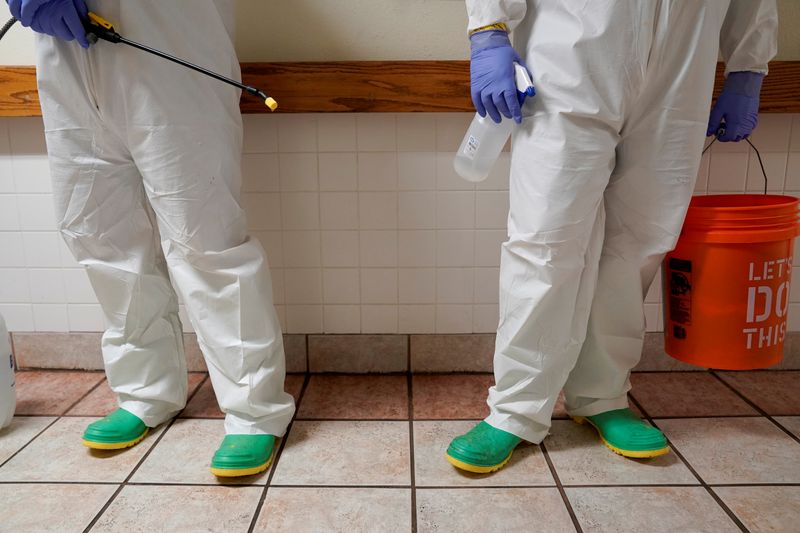By Sarah N. Lynch and Marisa Taylor
WASHINGTON (Reuters) - Eager to bolster the healthcare system during the coronavirus pandemic, the U.S. government last month sped $30 billion in stimulus payments to most healthcare providers that billed Medicare last year.
That speed resulted in taxpayers' money flowing to some companies and people facing civil or criminal fraud investigations, according to defense lawyers and others representing more than a dozen firms and people facing such inquiries.
The disclosures about such payments have prompted outrage among some congressional Democrats, who say they highlight the problems with how stimulus funds have been distributed.
"I have an enormous amount of frustration with the way the Trump administration is distributing these dollars, and examples like these magnify the consequences of the White House's efforts to limit transparency and stonewall oversight," Senator Ron Wyden, ranking member of the Senate Finance Committee, told Reuters.
Henry Connelly, a spokesman for House of Representatives Speaker Nancy Pelosi, added: "It is alarming to see the Trump administration giving precious taxpayer dollars to unscrupulous entities while so many hospitals and health care workers on the frontlines of the battle against coronavirus are desperate for resources."
The Department of Health and Human Services, which sent the payments, told Reuters it transmitted funds to all medical providers who submitted billings in 2019 to Medicare, the federal health insurance program for elderly and disabled Americans, unless they had already been excluded from participating.
It declined to respond to the criticism from Wyden and Pelosi's office and did not respond to specific questions from Reuters about the payments.
Katherine Harris, a spokeswoman for the HHS Office of the Inspector General, said her office oversees the program but declined to comment on the specific distribution of funding.
"While we cannot comment specifically on any work other than what has been publicly announced, I can tell you that we regularly perform reviews of the department's administration of programs, including the distribution of funding," Harris said.
Reuters was unable to independently determine what portion of the stimulus payments went to entities and individuals involved in civil and criminal actions with Medicare.
In an email to funding recipients seen by Reuters, HHS asked providers to sign a lengthy attestation that stipulates they have been or will be treating patients suffering from COVID-19, the disease caused by the new coronavirus.
If providers do not respond within 30 days, HHS said it will assume they have accepted the government's terms and conditions. It said in a statement it "has mechanisms in place to recoup funds and address fraudulent activity."
The funds came from the $2.3 trillion CARES Act passed by Congress to blunt the economic toll of the pandemic, which has killed more than 64,000 Americans and thrown at least 30 million people out of work.
Unlike the portions of that package intended to help small businesses, which required companies to apply for it, some of the healthcare funding was initiated by the U.S. Department of Health and Human Services and showed up as a surprise in the bank accounts of many healthcare providers.
Reuters interviewed six defense lawyers and others representing more than a dozen healthcare providers facing civil or criminal inquiries who received the money, including a pain medicine doctor who recently settled a civil false claims case, and an operator of an assisted living facility who is planning to plead guilty to healthcare fraud.
"The left hand does not know what the right hand is doing," said Joel Hirschhorn, an attorney who represents the pain medicine doctor and the operator of the assisted living facility.
The lawyers who spoke to Reuters declined to identify their specific clients, citing confidentiality rules.
The surprise deposit of funds has led attorneys to scramble to warn clients to be ready to return the money.
"There is no such thing as a windfall from the government," said Sam J. Louis, a former prosecutor who is now a partner with the law firm Holland & Knight, whose law firm issued an alert to clients warning them of the potential of legal liability in taking the funds.
Some former federal prosecutors say it would not have been difficult for HHS to weed out these providers first.
"If fraudulent providers, either convicted or under investigation, are receiving CARES Act bail-outs automatically, without any vetting, then shame on the government," said Paul Pelletier, one former prosecutor.
However, defense lawyers stressed that people charged with crimes are innocent until proven guilty, and they are not usually barred from billing Medicare until well after they are convicted of a crime. People facing criminal healthcare charges usually agree to stop billing Medicare as a condition of their bond, they added.
Another pool of practitioners eligible for the cash infusions include doctors who have lost their medical licenses or licenses to prescribe highly addictive drugs, said Ron Chapman, a lawyer in Miami.
HHS declined to say what portion of the $30 billion went to providers facing criminal or civil inquiries.
It said it distributed funds to more than 315,000 provider billing organizations reaching over 1.5 million healthcare providers.

In fiscal year 2019, investigations by the HHS inspector general's office led to 747 criminal actions and 684 civil actions.